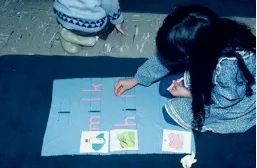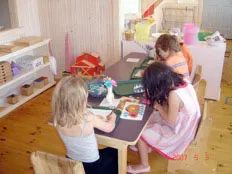Montessori and the Work Ethic
As our children go back to school, we all wonder if they will like school and if they will do well. The latest research is pointing out that using executive functions of focus and choices are the leading factors in long-term school and life success, as we spoke about in our last blog. Part of the executive functioning is learning to work and liking work.
Many of us grew up with a strong work ethic. We tried hard to do well and most of us still do. Many of our children have this same ethic, but for various reasons, quite a number of them do not have the same drive to succeed. They do what is required and that is all they do. Why is this?
For people who do strive, a big question is why? Is it from internal desires or to please external authorities? One young adult friend recently headed back to school after a break of some years. Shy by nature, she was unsure of what kinds of participation would be required at the advanced university level. One of the instructors began by telling her students that verbal interaction was optional. She would not require oral answers. Many students breathed a sigh of relief. By the third day of class, my shy student friend and many others were fully engaged in dynamic conversation and discussion. Once they were free to choose and not feeling judged by the teacher, they wanted to participate. This was a great example of a Montessori attitude at the university level.
The work ethic
 One of the most profound observations Maria Montessori made was that work is natural to human beings. Children love to work. Somehow, our schools have managed to force them to do tasks that are not developmentally appropriate and many children associate tedium rather than interest and enthusiasm with school work. I have often wondered how my teachers made science so boring when all my senses have loved what I see, hear, and touch in nature.
One of the most profound observations Maria Montessori made was that work is natural to human beings. Children love to work. Somehow, our schools have managed to force them to do tasks that are not developmentally appropriate and many children associate tedium rather than interest and enthusiasm with school work. I have often wondered how my teachers made science so boring when all my senses have loved what I see, hear, and touch in nature.

A fundamental example that touches perhaps millions of children is learning to write. In her landmark book, The Formation of Man, Montessori writes about this issue. Over several hundred years of institutional elementary school, children learn to write when they are about six or seven. It is dull and laborious for many children, even now. The problem is that the teaching is several years too late! Children go through a sensitive period for learning to write at about four- and-a-half. They are fascinated with controlling the movement of their hand and are sensitive to sensorial impressions, making the sandpaper letters a hit with four-year-olds the world around.
Simultaneous to the interest in tracing the letters, they are sensitive to new words and the sounds of their native language. They are also interested in building new words.

The timing is perfect for children learning to write and shortly thereafter—at about age five— learning to read what they have written.
Love of learning
When children learn what they are developmentally and neurologically sensitive to learning, they love learning. It is easy and natural, and you have children who love going to school every day and who set to work with enthusiasm. You don’t even have to ask them to work. You often have to tell them it is time to stop. I have had many Montessori children whose mothers or fathers have to wait at the classroom door because the children do not want to leave school.
But if their first experience in learning is difficult and boring, attitudes toward learning are formed and you have children who do not like school, children who will do the minimum rather than the maximum. We find in Montessori that we do not have to set artificial standards of what is done in each year. The children tend to go as fast as they can as far as they can, simply because they like the work we present to them. We even take complex concepts of spelling, math, geography and science and provide step-by-step hands-on materials. Each material isolates a new difficulty so there is never the sense of being overwhelmed if it is presented by a caring adult who understands the stages of development and how to match activities with emerging skills and interests.
Of course, it is not always this easy. We wish it were! Some children have difficulties in adapting to the classroom, to making choices, and to settling down. Some of our children have serious learning difficulties, physical challenges, or emotional imbalances. But for more than 100 years, Montessorians the world over have seen the fruits of freedom of choice in a carefully prepared environment in children who love to work and are fascinated by their own developing skills.
No matter what the age, Montessori principles of developmentally appropriate activities in a prepared environment can bring out the best in our children. And the results bring children to grade level and beyond.


Some outperform others, but that is not our main goal. Our main goal is to touch that core of loving to learn, and to launch the best unique development that is possible for each one. With this basic attitude toward learning and school, children can freely demonstrate their interests and skills both in home and school environments and receive the nurturing that allows them to flourish.
In E. M. Standing’s book, Maria Montessori: Her Life and Work, we read about a child who was asked by an observer, “Is this the school where you do what you like?” The child responded, “I don’t know if we do what we like, but we like what we do.” Now that’s wisdom from the mouths of babes!





















